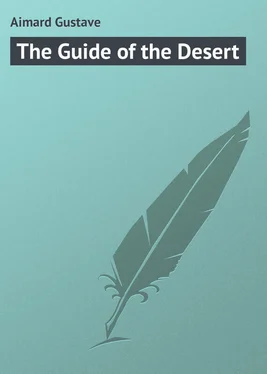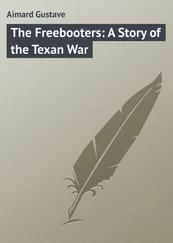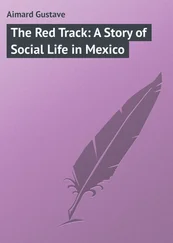Gustave Aimard - The Guide of the Desert
Здесь есть возможность читать онлайн «Gustave Aimard - The Guide of the Desert» — ознакомительный отрывок электронной книги совершенно бесплатно, а после прочтения отрывка купить полную версию. В некоторых случаях можно слушать аудио, скачать через торрент в формате fb2 и присутствует краткое содержание. Жанр: foreign_prose, на английском языке. Описание произведения, (предисловие) а так же отзывы посетителей доступны на портале библиотеки ЛибКат.
- Название:The Guide of the Desert
- Автор:
- Жанр:
- Год:неизвестен
- ISBN:нет данных
- Рейтинг книги:5 / 5. Голосов: 1
-
Избранное:Добавить в избранное
- Отзывы:
-
Ваша оценка:
- 100
- 1
- 2
- 3
- 4
- 5
The Guide of the Desert: краткое содержание, описание и аннотация
Предлагаем к чтению аннотацию, описание, краткое содержание или предисловие (зависит от того, что написал сам автор книги «The Guide of the Desert»). Если вы не нашли необходимую информацию о книге — напишите в комментариях, мы постараемся отыскать её.
The Guide of the Desert — читать онлайн ознакомительный отрывок
Ниже представлен текст книги, разбитый по страницам. Система сохранения места последней прочитанной страницы, позволяет с удобством читать онлайн бесплатно книгу «The Guide of the Desert», без необходимости каждый раз заново искать на чём Вы остановились. Поставьте закладку, и сможете в любой момент перейти на страницу, на которой закончили чтение.
Интервал:
Закладка:
Aimard Gustave
The Guide of the Desert
Gustave Aimard was the adopted son of one of the most powerful Indian tribes, with whom he lived for more than fifteen years in the heart of the Prairies, sharing their dangers and their combats, and accompanying them everywhere, rifle in one hand and tomahawk in the other. In turn squatter, hunter, trapper, warrior, and miner, Gustave Aimard has traversed America from the highest peaks of the Cordilleras to the ocean shores, living from hand to mouth, happy for the day, careless of the morrow. Hence it is that Gustave Aimard only describes his own life. The Indians of whom he speaks he has known – the manners he depicts are his own.
CHAPTER I
A PRISONER
Loading in the environs of Barbara Bay, Cape Horn, I was surprised, with two companions, by the Patagonians, and made prisoner. I had the pain of witnessing from the cliffs the departure of the whaler on board of which I had entered at Havre as harpooner.
It was with a deep pang of grief, and eyes bathed in tears, I saw the white sails of my ship disappear on the horizon, and the sea become solitary once more.
I little suspected that the vessel I then saw for the last time was doomed to some terrible fate. Nothing was ever heard of her again.
Two hours later, stripped of our clothes and tied by the wrists to the tails of Patagonian horses, we were carried off into the interior of the country.
The Patagonians, with regard to whom travellers relate so many fables, are neither so gigantic nor so evil as generally represented.
They are sturdily independent. The least yoke galls them, and rather than submit to the will of a chief, they rush off into exile, and submit to the most terrible privations.
We were not ill-used by our captors, but I was at length alone. One of my companions went raving mad, the other committed suicide. I was kept alive, I believe, by the spirit of hope.
I was twenty years of age, and had a constitution of iron, as well as a buoyancy of spirits, a boldness and firmness, which saved me from myself, by permitting me to look upon my position in its true light. Cruel as it was, it was far from being desperate.
My first care was, by invariable complaisance, to secure the goodwill of the savages, in which I succeeded pretty well, more easily, indeed, than I should have dared to hope.
However, when in the evening after a whole day's journey in the interminable steppes of Patagonia, I threw myself, overcome with fatigue, before the bivouac fire, while the savages laughed and sang among themselves, I often felt my heart on the point of bursting by reason of the efforts I made to suppress my sighs.
How many times have I felt my courage fail! How many times has the thought of suicide burst upon my mind! But, always at the most critical moment, the hope of deliverance arose to put new life into my heart; my sufferings were calmed little by little, my frame ceased to be agitated, and I slept, murmuring in a gentle voice one of those national refrains which are, for the exile, a sweet and far-off echo of the absent country.
Fourteen months thus passed away, hour by hour, second by second, in an incessant and frightful torture.
Always on the watch to seize an opportunity of escaping, but not wishing to leave anything to the risk of failure, I had had the greatest care not to awaken the drowsy mistrust of the Patagonians. I always affected, on the contrary, not to wander too far from the tribe; so the Indians had at last come to allow me to enjoy comparative liberty amongst them; and instead of compelling me to follow them on foot, they decided of their own accord to allow me to mount on horseback.
It was only on horseback that I could dream of escaping.
The Patagonians are some of the first horsemen in the world. In their school I made rapid progress; and, however wild and vicious might be the horse that they gave me, in a few minutes I subdued him, and made myself completely his master.
Our wandering and purposeless journeys conducted us at last to about ten leagues from the Carmen of Patagonia, the most advanced fort constructed by the Spaniards on the Río Negro, at the extreme frontier of their former possessions.
The troop camped for the night at a little distance from the river, near an abandoned farm.
The opportunity for which I had waited so long had come at last. I prepared to profit by it, convinced that if I did not escape now, I should die a slave.
I will not fatigue the reader with the details of my flight; I will content myself with simply saying that after a devious journey, which lasted seven hours, and during which I constantly felt the smoking nostrils of the horses on my track, on the croup of the one I rode; after having escaped twenty times by a miracle from the bolas which the Patagonians threw at me, and from the sharpened points of their long lances, I came unexpectedly upon a patrol of Buenos Airean horsemen, in the midst of whom I fell fainting, overcome by fatigue and excitement.
The Patagonians, suddenly taken aback by the appearance of white men, whom the high grass had hidden from them till that time, turned tail with fright, and fled away, howling with fury.
I was saved!
By my singular equipment – all the clothing I had on was a frazada (blanket) in rags, fastened round the body by a leather strap – the soldiers at first took me for an Indian, a mistake which was rendered more natural by my complexion, bronzed by the severity of the seasons to which I had been so long exposed and which had assumed nearly the colour of copper. As soon as I regained consciousness, I hastened to disabuse them as well as I could, for at that time I could only speak the Spanish language very imperfectly.
The brave Buenos Aireans listened with signs of the liveliest sympathy to the recital of my sufferings, and lavished on me the kindest attentions.
My entry into Carmen, in the midst of my preservers, was a veritable triumph.
It required nearly a month to enable me to recover from the long sufferings which I had endured, and from the privations of all kinds to which I had, during so long a period, been condemned; but, thanks to the attention by which I was surrounded, and especially thanks to my youth and the vigour of my constitution, I at last regained my health.
The governor of Carmen, who had become much interested in me, agreed at my request to give me a passage on board a little Buenos Airean brig, then anchored before the port, and I left for Buenos Aires, with the firm intention of returning to France as soon as possible – so much had the rude apprenticeship I had had to American life disgusted me with travel.
But it was not to be so, and before again reaching France – I was to wander for twenty years an adventurer in all the countries of the world – from Cape Horn to Hudson's Bay, from China to Oceania, and from India to Spitzburg.
On my arrival in Buenos Aires, my first care was to present myself to the French consul, to ask of him the means of returning to Europe.
I was well received by the consul, who, on proofs of my identity, immediately informed me that there was no French ship in the harbour, but that need not disquiet me, since my family not receiving news of me, and fearing that I might find myself in a difficult position from the want of money, if any misfortune had happened to me during my voyage, had written to all our agents in foreign countries, so that anyone to whom I might present myself might give me, on my demand, a sum adequate to supply my wants, and put me in a position, if I wished it, to try my fortune where chance should have conducted me. He concluded by adding that he held at my disposal the sum of 25,000f., and that he was ready to give it me immediately.
Читать дальшеИнтервал:
Закладка:
Похожие книги на «The Guide of the Desert»
Представляем Вашему вниманию похожие книги на «The Guide of the Desert» списком для выбора. Мы отобрали схожую по названию и смыслу литературу в надежде предоставить читателям больше вариантов отыскать новые, интересные, ещё непрочитанные произведения.
Обсуждение, отзывы о книге «The Guide of the Desert» и просто собственные мнения читателей. Оставьте ваши комментарии, напишите, что Вы думаете о произведении, его смысле или главных героях. Укажите что конкретно понравилось, а что нет, и почему Вы так считаете.












